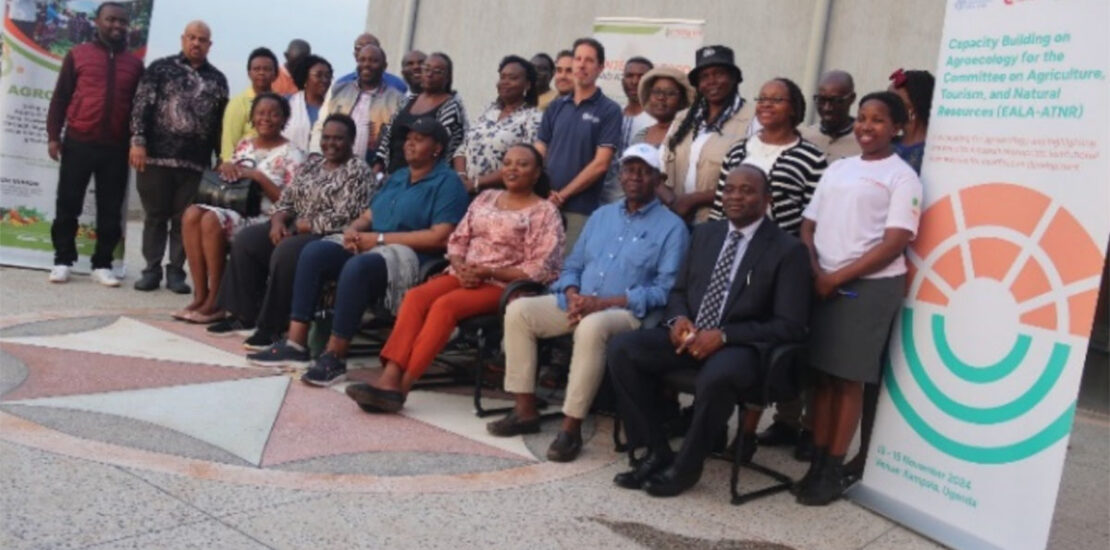EALA-ATNR Commits to Agroecology: Paving the Way for a Legally Recognised, Sustainable Food Future in East Africa
- November 30, 2024
- Posted by: CEFROHT Reporter
- Category: Agroecology

In a historic and forward-looking development, the Committee on Agriculture, Tourism, and Natural Resources (ATNR) of the East African Legislative Assembly (EALA), in collaboration with the Food and Agriculture Organization (FAO) of the United Nations and the Centre for Food and Adequate Living Rights (CEFROHT), has officially adopted a resolution recognising agroecology as a strategic priority for sustainable food system transformation in the East African Community (EAC).
This milestone was achieved during a high-level Capacity Building Workshop on Agroecology, held in Kampala, Uganda, on 15 November 2024, with technical support from FAO Rome. The workshop brought together a diverse group of stakeholders, including legislators from the EALA-ATNR Committee, FAO technical experts, civil society leaders, academic researchers, and smallholder agroecology farmers. Hosted by CEFROHT, the event provided a collaborative platform to build knowledge, share experiences, and explore ways to institutionalise agroecology across EAC member states as a legally protected and development-supported model of agriculture and food governance.
The resolution comes at a critical juncture, as East Africa, like much of the world, grapples with the adverse impacts of industrial agriculture and climate change—including soil degradation, biodiversity loss, rising food insecurity, and the erosion of traditional farming knowledge. These challenges disproportionately affect smallholder farmers, particularly women and youth, who form the backbone of the region’s food production.
Agroecology offers a solution that is not only environmentally sustainable but also socially and economically empowering. Grounded in principles of ecological balance, cultural knowledge, farmer autonomy, local seed systems, diversified production, and social equity, agroecology stands in contrast to industrial systems reliant on imported inputs and monocultures. Instead, it champions resilient, place-based farming systems that restore ecosystems while nourishing communities.
The EALA-ATNR Committee’s resolution, as outlined in the official EALA communication, acknowledges that regional policies adopted by the EAC often guide and shape national legislation. By declaring agroecology a regional strategic priority, the Committee has laid the groundwork for East Africa to formally integrate agroecological approaches into regional agricultural and environmental frameworks, sustainable tourism and natural resource governance policies, and trade, investment, and food sovereignty discussions within EAC institutions.
The resolution signals a paradigm shift—away from chemical-intensive, industrial agricultural development towards ecologically sound, rights-based, and inclusive food systems. It calls upon EAC partner states and institutions to develop and adopt regional and national legal and policy frameworks on agroecology, establish institutional support mechanisms that promote farmer-led innovation and agroecological research, recognise and protect indigenous seed systems as fundamental to food security, and mobilise resources to scale agroecology through public investment, extension services, and farmer cooperatives.
Building on this momentum, CEFROHT has taken a leading role in spearheading the development of a Regional Model Law on Agroecology. This initiative aims to provide a comprehensive legal instrument that EAC Partner States can adapt and domesticate, offering a standardised, rights-based framework to guide the legal recognition of agroecology, the governance of ecological inputs and organic farming systems, the protection of community-managed seed systems, and the integration of agroecology into national budgets and climate adaptation strategies.
Envisioned as a living document, this legal framework will be shaped through ongoing dialogue with farmers, civil society, legal experts, and policy institutions. It draws legitimacy from both customary agricultural knowledge and contemporary environmental law, ensuring agroecology is not merely practised on the margins but formally recognised and protected at the highest levels of governance.
CEFROHT’s work on the regional model law aligns with global frameworks such as the UN Sustainable Development Goals (SDGs)—particularly Goal 2 (Zero Hunger), Goal 12 (Responsible Consumption and Production), and Goal 13 (Climate Action)—as well as the African Union’s Agenda 2063, which promotes inclusive growth, climate resilience, and sustainable land use. It also resonates with the Cartagena Protocol on Biosafety, reinforcing the need for caution in adopting genetically modified organisms (GMOs) in Africa’s agricultural systems.
The Kampala engagement and resolution mark a turning point in East Africa’s agricultural future. With EALA legislators now actively supporting agroecology and committing to influence regional policies, the groundwork is being laid for systemic transformation. CEFROHT’s legal and technical leadership further strengthens this shift, advocating for a formal regional policy that honours ecological wisdom, upholds farmer dignity, and guarantees the right to adequate food.
Moving forward, realising a just and sustainable food future in East Africa will require robust, multi-stakeholder collaboration. Civil society organisations, regional institutions, national governments, farmers’ groups, academia, donors, media, and the private sector must unite around a shared vision for resilient, equitable, and ecologically sound food systems. Anchored in a human rights-based approach, CEFROHT is leading efforts to establish a broad-based coalition to advance the Regional Model Law on Agroecology. This coalition brings together civil society organisations, academic institutions, smallholder farmers, public interest lawyers, and media practitioners to collectively shape a legal and policy framework centred on the right to food, farmers’ rights, environmental justice, and community sovereignty.
The EALA-ATNR Committee’s recognition of agroecology as a regional priority is not merely symbolic—it is a legislative and policy signal that the time for agroecology in East Africa has arrived. CEFROHT’s leadership in developing a Regional Model Law on Agroecology represents the next crucial step in translating these commitments into enforceable frameworks that benefit both people and the planet. Together, these efforts illuminate a future where food systems are not only productive but also just, regenerative, and inclusive.
